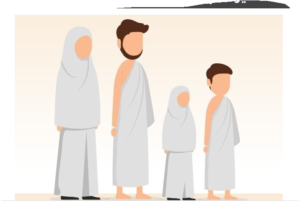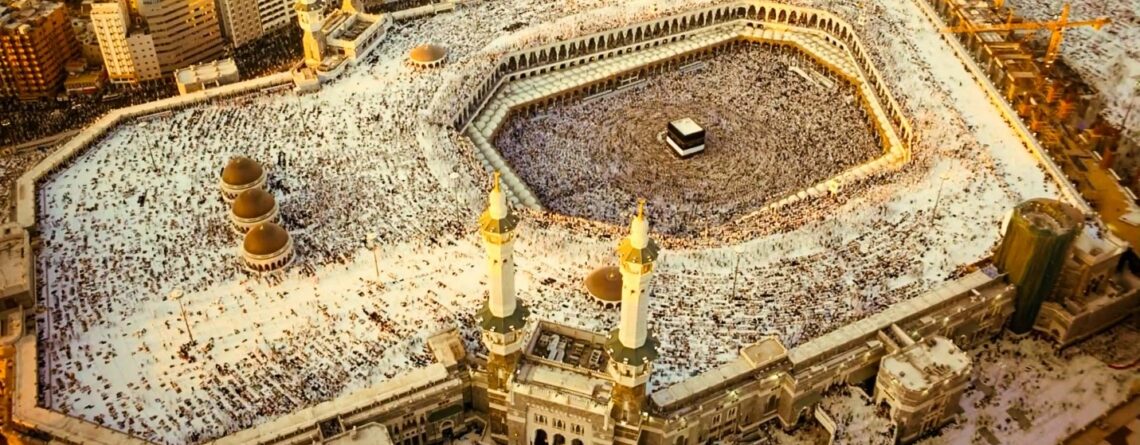What is the Hajj pilgrimage?
Hajj is one of the best forms of worship and is one of the most sublime deeds because it is one of the pillars of Islam that Allah sent Muhammad (peace be upon him) with. A servant’s religion is incomplete without it.
Abu Hurairah narrated that he heard Prophet Muhammad (peace and blessings be upon him) say:
“Whoever performs Hajj and does not commit any obscenity or transgression will return [free from sins] as he was on the day his mother gave birth to him.” (Al-Bukhari)
-It takes place during Dhu al-Hijjah, which is the final month of the Islamic calendar.
-Every year, millions of Muslims from across the world make the journey to Mecca from wherever they live.
Why do Muslims go on this pilgrimage?

Hajj is one of the five pillars of Islam. These are the five key facts that every Muslim is expected to do in their lifetime.
In addition to Hajj, the other important acts are:
- Shahadah – A declaration of faith that every Muslim has to make
- Salat – Muslims pray at specific times five times a day
- Zakat – those within the faith give away a portion of their income to help those in need
- Sawm – Muslims fast for a month during Ramadan
Muslims are required to make the journey to Mecca at least once in their life if they are physically able and can afford to do so.
Why is Mecca so important?
Mecca is the place where the Islamic religion started. It is significant for two main reasons.
- Firstly, it is where the prophet Muhammad was born.
- Secondly, it is where he received the first revelations from Allah that went on to become the Quran – the holy book read by Muslims.
- Third, All Muslims pray in the direction of a sacred building called the Kaaba, which is found within the Great Mosque of Mecca.
This is the holiest site in Islam and symbolizes the oneness of God

What happens during Hajj?
Muslims carry out a number of important rituals while they are on the pilgrimage.
- Upon arrival at Mecca, they enter a sacred state of purity known as Ihram. Men are required to wear two sheets of white cloth, which are worn in a specific way. Women wear traditional clothing and must cover their heads, but not their faces. These clothes symbolize the equality of all Muslims before Allah.
- During the first stage of Hajj, Muslims walk around the Kaaba in an anti-clockwise direction seven times. This is known as Tawaf and is done to show that all Muslims are equal.
- The next ritual requires Muslims to run between two hills, Safa and Marwah, seven times. Muslims believe that the prophet Ibrahim’s wife Hagar did this when she was in search of water for her infant son Ismail. Ismail is believed to have struck his foot on the ground and this produced a spring of water known as Zamzam. It is common for those on the pilgrimage to take water from Zamzam with them when they go back home.
- After this, pilgrims travel to the plain of Arafat. This is where the Prophet Muhammad gave his final sermon and Muslims pray to God here for forgiveness and guidance.
- Next, Muslims stop at three pillars called Jamarat. This is where pilgrims throw stones at three pillars which stand at the place where Satan is believed to have tempted the Prophet, Abraham.
- Muslims celebrate the festival Eid ul-Adha at the end of Hajj. This is the second holy festival of the year.
Eid ul-Adha marks Allah appearing to the prophet Ibrahim in a dream and asking him to sacrifice his son Ismail as an act of obedience to God. The Koran then says the devil tempted Ibrahim, by encouraging him to disobey Allah and spare his son.
As Ibrahim was about to kill his son, Allah stopped him and gave him a lamb to sacrifice instead.

What is Hajj? Teach your Child…
Hajj is one of the five basic pillars of Islam, and it happens once every year during the month of Dhul Hijjah. Muslims from all over the world make their way to Makkah in Saudi Arabia. Each Muslim must make this journey at least once in their lifetime if they are able. Therefore, 10 days of this special month are celebrated by Muslims around the world in recognition of those performing Hajj.

